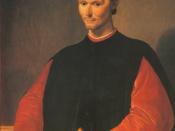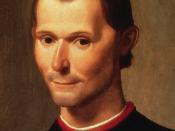Machiavelli's, 'The Prince', is a work almost entirely consumed with understanding the relationship between a leader (in this case referred to though not confined to a Prince) and his subjects or citizens. Machiavelli explores this relationship on several levels throughout his work, tending to describe the Prince and his traits from the perspective of the people over which he rules.
As the focus of much of the work is reliant upon the view of a Prince in the eyes of his subjects the question as to whether Machiavelli himself was a Machiavellian is a particularly interesting one. Machiavelli, in his role as emissary for the Florentine people was of course additionally the subject of the ruling elite he represented, as such was in an important position enabling him to assess how a leader would be successful. His close role within the Florentine republic as an emissary and his indirect contact with the Medici who later ruled the republic are the sources that provide the basis of his work.
Machiavellianism - "The political doctrine of Machiavelli, which denies the relevance of morality in political affairs and holds that craft and deceit are justified in pursuing and maintaining political power."
It has been noted by a number of analysts that Machiavelli's name has become synonymous with the idea of corrupt, brutal and wrongful leadership or governance . By having this association related to him in such a direct way much of what Machiavelli stands for is tarred with the same brush. In 'The Prince' it is clear that Machiavelli is reflecting the form of rule he experiences being exerted by the leadership in Florence whilst also drawing general conclusions on other leaders. It could be argued that 'The Prince' is simply Machiavelli's in observance of a subject and simply noting what he...


